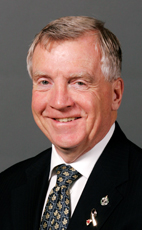Mr. Speaker, the Pearson Peacekeeping Centre is recognized internationally as a leading centre of excellence in its field. Since its beginnings, the PPC has trained over 10,000 foreign military, police and civilians from 140 countries and has delivered courses in 31 countries. Pearson graduates can be found in key posts around the world.
I will focus my comments today on the outstanding work the Pearson Centre is doing in Africa, in support of the Prime Minister's commitment with his G-8 colleagues at St. Petersburg to enhance global capacity for peace operations with a focus on that continent.
The Pearson Centre engagement in Africa began with the CIDA funded Programme de développement des capacités en maintien de la paix et sécurité launched at the Summit of la Francophonie in Moncton in 1999. Through this initiative, programs and curricula were developed that strengthened the capacity of thousands of Francophone African military officers, civilian police and civilians to take part in peace operations.
There is an established and urgent need for well-trained, French speaking personnel to work in major peace missions around the world in countries like the Democratic Republic of the Congo, Haiti, Burundi and Côte d'Ivoire. The Pearson Centre's history of training assistance in Africa, as well as its bilingual ability to provide training assistance in both French and English, enables it to effectively respond to this requirement.
The Pearson Centre is also working to expand the training capacity of regional training institutions in Africa such as the Kofi Annan International Peacekeeping Training Centre in Ghana as well as at l'École de Maintien de la Paix in Mali that play an important role in building African capacity to manage conflict and face future crises. Within the space of a few years and with the support provided by the Pearson Centre, the Kofi Annan centre has emerged as a state of the art and internationally recognized training facility.
The Pearson Centre is also a key partner of Mali's École de Maintien de la Paix, EMP, where it provides, with federal government assistance, about one-third of the school's instructional program. Since the EMP early beginnings, upwards of 1,400 African officers have been trained with the support of the Pearson Centre. Officers leave the school with a greatly enhanced knowledge of modern multidisciplinary peace operations, thus increasing their ability and those of the forces in which they serve to contribute effectively to peace operations in Africa and elsewhere in the world.
Another area where the Pearson Centre is having a tremendous impact in Africa is in helping to meet the growing demand for civilian police, or CIVPOL, in peace operations.
International police peacekeeping is an essential component of Canada's engagement in building a more secure world through stabilizing failed and fragile states.
Over time, not only the number of UN police has substantially increased, but as with other elements of peacekeeping missions, mission mandates have evolved significantly from simple monitoring activities to active engagement in implementing the rule of law such as executive policing in places like Kosovo and East Timor, to direct participation in assisting post-conflict stabilization, peace building and security sector reform such as in Haiti.
It is estimated by the United Nations that there will be a need for up to 29,610 trained civilian police over the next five years due to the current surge in peacekeeping. The Pearson Centre is making tremendous headway in addressing this challenge.
Through the West African police project, or WAPP, the Pearson Centre is strengthening the capacity of six west African countries, Burkina Faso, Ghana, Mali, Nigeria, Senegal and Sierra Leone as well as the Economic Community of West African States to provide civilian police to peace operations. Since the project began in 2005, CIVPOL deployments from these countries have more than doubled.
Supporting greater integration of women into peace operations is called for by United Nations Security Council resolution 1325. Such results, to Canada's credit, are being noticed internationally. The United Nations and others have called for the expansion of the Pearson Centre programming in Africa.
The Pearson Centre serves Canadian foreign policy interests through its training and capacity building assistance in Africa. It further serves to demonstrate Canada's commitment to integrated multi-disciplinary international peace operations. It is for this reason that successive governments have provided the Pearson Centre with core funding since its creation in 1994, as well as specific program funding assistance ever since.
I will address the remarks of the hon. member for Halifax for just a moment. She and her colleagues of the New Democratic Party will never understand the concept of peace through strength.
I point out for her that the NATO family, which she is so quick to denigrate and so happy to denigrate every chance she gets, was responsible for keeping the nuclear annihilation, of which she fears rightly, at bay throughout world war three, which, as we call it, was the Cold War. We won that war. We won it without firing a shot. We won it by peace through strength. There were a lot of losses suffered, many of whom were friends of mine. We did not fire a shot and it was done by peace through strength.
Despite the prevalence of inhumanity and terrorism, there are still opportunities for Pearsonian style peacekeeping. There are still sacrifices to be made.
I would be remiss if I did not acknowledge today the loss yesterday of Corporal Benoit Chevalier, the Canadian peacekeeper who was lost in the Sinai, with eight French peacekeepers, in the crash of an aircraft.
“At the going down of the sun and in the morning...We will remember them”.

